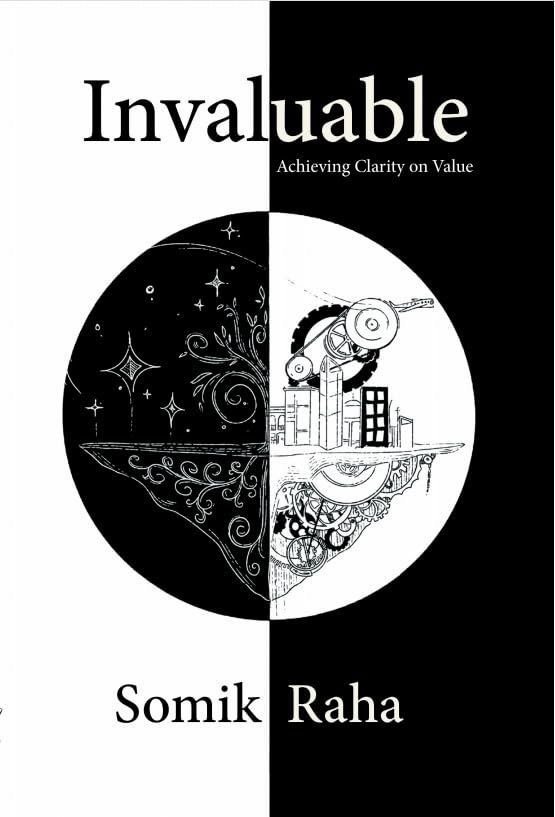Discover Your True Self: ‘Invaluable’ by Somik Raha – A Journey to Happiness and Clarity
“Invaluable: Achieving Clarity on Value” by Somik Raha helps you discover your true self and happiness with practical tools and fresh perspectives.

An excerpt from the book: Page 58-61
WHEN SERVICE BECOMES JOY
Now that we have tackled the delusions around the purpose of business being about making profits, creating shareholder value, or delivering impact, we are ready to return to the idea of the purpose of business being service. A famous quote attributed to the Nobel Prize–winning poet Rabindranath Tagore captures the heaviness of service:
“I slept and dreamt that life was joy.
I awoke and saw that life was service.
I acted and behold, service was joy.”
In the second line of the poem, Tagore recognizes that service is a heavy thing when viewed from afar. When we are not finding work meaningful, seeing someone else serve with joy only makes us painfully aware that something is missing in our context. Vicarious inspiration tends to be short-lived but is good insofar as it inspires our own quest for meaning. For our own experience of service as joy, we have to engage in action, as the third line points out. However, there is a mystery here. How did we go from an act of service to a feeling of joy? The answer lies in a single word that appears in each of the three lines. It is the word “I,” which represents our limited ego. It is the “I” that dreamt up joy. It is the “I” that experienced the reality of the world where service is needed. And it is the “I” that had to find a way to use its unique conditioning to go beyond its bounds to touch another, and in so doing, touch life itself through the feeling of joy. Knowing the unique conditioning of this “I” is critical to unlocking our authentic service. Imagine a flute player who is not willing to accept the fluteness of the music a flute produces, and instead laments that the flute does not sound like a saxophone. That flute player will never make great flute music! We are that flute player. The sound of the saxophone is the narrow agenda we are chasing. It is not authentic to the unique sound of the instrument we have at our disposal, our own conditioned selves. Our joyful service can only be unlocked when we accept our fluteness, which is our unique conditioning, and use it to produce the unique music of our heart.
It is when our unique conditioning can be deployed to express the song of our heart that the “I” makes an audacious leap into the boundless. It is this leap that connects us to a very real feeling of joy. To be able to see and accept our unique conditioning as well as listen to the music we want to express with that conditioning, we have to empty ourselves of all our narrow agendas. We might then find that the game has always been about joyful work.
The service that Swami R. was talking about is not reflected by measurable likes or validations from our customer service portal. Hisdefinition of business is centered on our volition to serve with our full uniqueness, without adhering to someone else’s measurable metrics thatwe fall short on. With that reorientation, we are ready for a radical redefinition of the purpose of business:
The purpose of business is to be a canvas for our unique service.
Aphorism 1.5
This aphorism implies that the volition to serve is already there. It has to be discovered and contextualized. If our volition to serve is not coming out in our present context, it means we have to work hard at changing our context. A canvas also has limitations—it exists for a period of time and occupies a certain dimension in space. If we go off the canvas, we can’t paint in the air. For our life’s art to land, we need to paint on our available canvas—not someone else’s canvas, and not outside the canvas. We also get to participate in the evolution of the canvas, which comes with its own associated set of brushes, textures, and colors. Perhaps the most radical reorientation in this redefinition of work is that the focus is now front and center on you, the artist. It is about your volition to serve. You are not employee #994. You are a unique artist, who has been invited into the masterpiece a community is building with joy. Whether this is your masterpiece to participate in requires an inner search that no job description or career counselor can fully resolve for you.
This feels rather heartwarming in many ways, you say. This perspectiveis quite different from a hyperaggressive view of business. There seems to be enough space for diversity and creativity. But (and the royal but), this is poetic. I have quoted a great poet, no less, you point out. How many centuries will it take for our business leaders to think in this way?
One might think that it is too radical and fundamental of a shift to propose that business is not about making money but expressing our deepest joy. Let me disabuse you of that notion, through a quote attributed to Henry Ford, regarded by most as the father of American business:
“Business must be run at a profit, else it will die. But when anyone tries to run a business solely for profit . . . then the business must die as well, for it no longer has a reason for existence.”
Great business leaders are not at all confused about this. A quote attributed to Walt Disney puts it even better:
“I don’t make movies to make money, I make money to make more movies.”
The passion Disney exhibited when he took twenty years to make Mary Poppins is now a matter of public record. Once he had identified the actor to play the role, the superbly talented Julie Andrews, he did not hesitate to postpone the making of the film as Andrews was pregnant. His passion for finding great stories and great talent and bringing them together was a part of his creative joy. The money that the movie had to make was important so he could put food on the table for all the people who participated in such projects.
When we start to reorient ourselves around business as a canvas for serving with our uniqueness, even if it is one person at a time, we will end up changing the dominant paradigm. You are finding this so fascinating, but, you remind me, you have to go into work tomorrow. Would you not get fired if you were to challenge the premise of your business? You might, so I would certainly caution you about reading further. Not everyone is blessed with spaces where those around are well-wishers. I can only share my experience of the first time I had the courage to challenge the norm.

About the author
Somik Raha, raised in India, brings together his Eastern upbringing with over two decades of Western experience. His journey from coding at age 12 to a deep exploration of philosophy led him to examine the human aspect of technology. Holding a PhD from Stanford, his focus lies in achieving clarity on value. Currently based in the Bay Area, Somik continues to explore the intriguing intersection of technology, philosophy, and humanity.
Excerpt carried with due permission from the author and the publisher, Indie Press.

